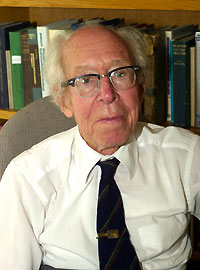|
This is an archived article.
For the latest news, go to the
Advance Homepage
For more archives, go to the Advance Archive/Search Page. | ||
|
History Of Chemistry Is Emeritus Professor Emeritus John T. Stock is a chemist with a lifelong interest in the history of science. His passion, even at the age of 92, is to chronicle the accomplishments of some of the people involved in developing the discipline of chemistry, in the hope that today's students won't "think that these techniques and instrumentation sprang fully developed from nowhere."
His latest contribution is a book, Ostwald's American Students (Plainswede Publishing, 2003), about some of the American students who went to the University of Leipzig in the early 1900s to study under the German physical chemist Wilhelm Ostwald. About 400 American students pursued doctoral studies in chemistry at German universities, which had systems for advanced research that were not then available in the United States. Many of the Leipzig Ph.D.'s returned to America with ideas and skills that led to outstanding careers in commerce and industry. Others returned home to revolutionize the teaching of chemistry. Among those profiled in Stock's book are Arthur Amos Noyes who, in 1919, left a job teaching chemistry at the Massachusetts Institute of Technology to help develop Throop College, which was later renamed the California Institute of Technology. Another is Eugene Cornelius Sullivan, who invented Pyrex glass while working as a chemist at Corning Glass on a project to reduce the breakage of railroad lantern globes and signal lenses from thermal shock. A third is Willis Rodney Whitney, who was hired by the General Electric Co. to open the first American industrial research laboratory in 1900. Stock, who retired in 1979 after teaching at UConn for 23 years, says that if any elementary chemistry textbook even mentions Ostwald, it is probably in connection with his discovery of the catalytic oxidation of ammonia to nitric oxide. "This was of tremendous industrial importance because once you have nitric acid, you can make anything, including explosives," Stock explains. "Until Ostwald's discovery, Germany's armaments industry depended on Chilean imports of potassium nitrate obtained from bird droppings to make bombs and artillery shells." In addition to his own investigations, Ostwald and his assistants developed and championed the "ionic theory," the hypothesis that an electrolyte such as sodium chloride breaks up into ions in solution. "This was incredible to most people at the time," notes Stock. "Some other chemists opposed it bitterly. Yet because of Ostwald's early and unwavering support of this theory, he and his students became known as the 'ionists'." Stock says Ostwald's students worked during an exciting time in the development of chemistry. "Ostwald was such a revolution," he says. "Four of his closest assistants received Nobel prizes. Together, as a group, they developed new theories that revolutionized chemistry at the end of the 1800s." Unfortunately, little of this history is being taught today, says Stock, who has surveyed American colleges and universities to find out whether the history of chemistry is being taught. "Most chemistry departments say they haven't time to teach any history but try to slip it in," he says. "A few textbooks contain thumbnail sketches of personalities and what they did." Stock's book is based on five years of research in Germany, the United States, and England. It is dedicated to the faculty, staff, and students of the chemistry department; and royalties from sales of the book at the UConn Co-op will be deposited into an account to support chemistry research. Ostwald's American Students is the third book Stock has written since he retired. He also has published about 70 articles, made 40 oral presentations at national meetings of the American Chemical Society, and received the 1992 ACS Dexter Award for Outstanding Contributions to the History of Chemistry. |

